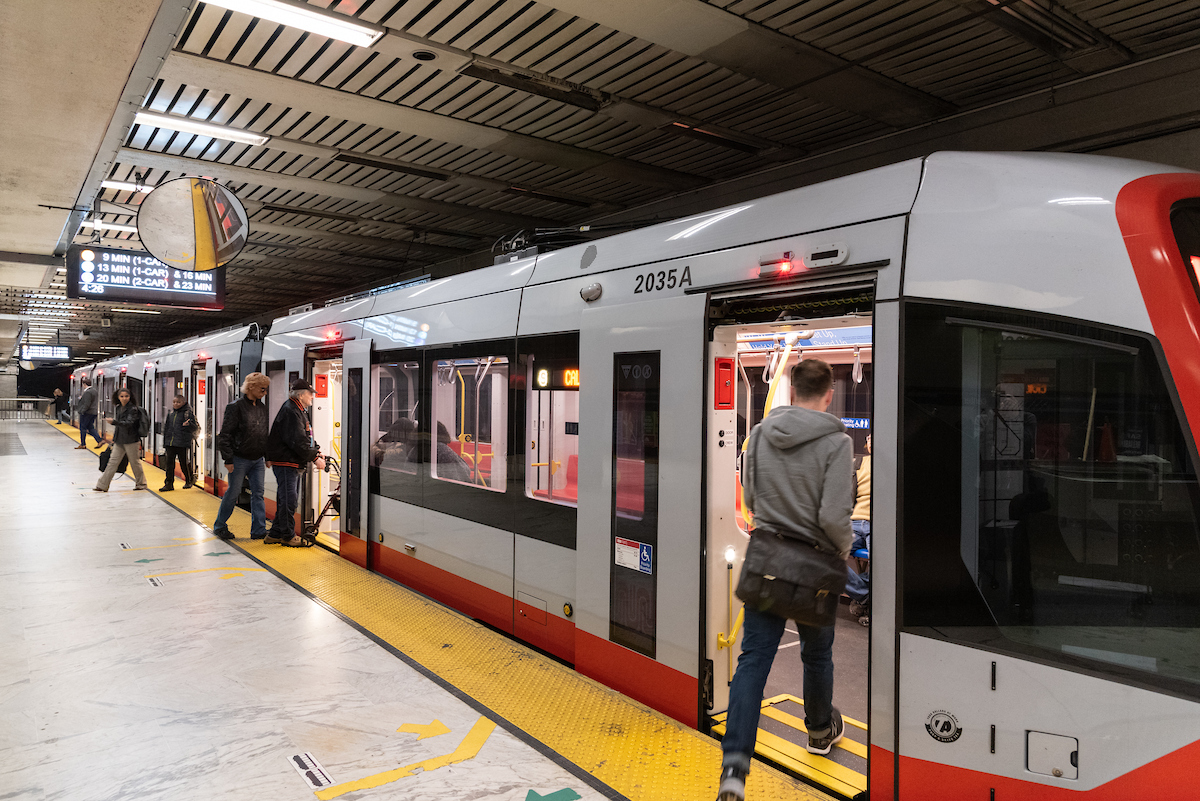
This week, the SFMTA Board of Directors discussed the agency’s upcoming two-year budget, which must be submitted to the Mayor’s Office before May 1.
The budget will cover two fiscal years:
-
FY 2024-2025 (July 1, 2024 – June 30, 2025)
-
FY 2025-2026 (July 1, 2025 – June 30, 2026)
Transportation is vital to San Francisco’s livability and vitality, as well as to the city’s economic recovery, equity and environmental goals. The next two-year budget will fund a variety of programs and services, including:
-
Muni service on 72 routes supported by operators, maintenance staff, station agents, car cleaners, transit planners, engineers and more.
-
Pedestrian and bicycle infrastructure, Vision Zero, traffic calming measures, major street infrastructure improvements and parking curb and traffic management.
-
Mobility services including paratransit, accessibility improvements, taxis and powered scooter share and commuter shuttle program enforcement.
Community Engagement
As we develop this two-year budget, we will provide regular updates and hold formal hearings at the SFMTA Board of Directors meetings. You can watch these on SFGOVTV.
We will also host two budget listening sessions for the public. One will be a virtual meeting, and the other will be an in-person open house. At these events, you can meet staff, ask questions, provide suggestions and learn how the agency is funded and allocates its resources.
-
Virtual Meeting (via Zoom): Thursday, Feb. 22. 2024, from 5:00 pm – 7:00 pm.
-
In-person Open House: Saturday, March 2, 2024 at the Richmond branch of the San Francisco Public Library (351 9th Ave, San Francisco, CA), from 11:30 am – 1:30 pm
Additionally, we will present our budget proposal at neighborhood group, merchant association and community-based organization meetings.
How we propose to balance the budget
As we develop the two-year budget, we are focused on how we can best use our limited resources to keep San Francisco moving. We anticipate a $12.7 million deficit during the FY 24-25 and FY 25-26 budget cycle. This is because we are still recovering from the economic impact of the COVID-19 pandemic.
Muni revenue is 56% of pre-pandemic levels and parking revenue is 12%. This decrease in revenue makes our long-standing structural deficit worse. Even before the pandemic, our revenues were less than what we needed. They were not enough to meet the increasing demand for our programs and services.
To close the budget gap, we’ve restricted our hiring to key positions and made Muni service more efficient. Because service is faster and more reliable, we can deliver more service for the same amount of money. We’ve also limited Muni service changes to ones that are “cost neutral.” We are doing this by shifting vehicles and operators from less crowded Muni routes to routes where the demand is high.
But these changes aren’t sufficient to balance our budget. So, we’re proposing modest increases to Muni fares, parking fees and fines and taxi fees. These are the changes our staff have proposed to the agency’s Board of Directors to bridge the $12.7 million gap:
Muni fares: Eliminate Clipper discount over two years (to generate $5.2M in revenue)
Currently, people who use Clipper cards pay $.50 less per Muni trip than people who pay cash. We propose reducing the Clipper discount by $.25 per trip in FY 2025 and an additional $.25 per trip in FY 2026. This would create a consistent fare for all customers. The Clipper card discount was implemented 10 years ago to get Muni riders to switch to Clipper. Data shows that most riders have already switched to Clipper. The discount is no longer needed and should now be the same as the cash fare. The SF Paratransit one-way fare is indexed to the Muni Clipper fare and would increase to $2.75 in FY 2025 and $3.00 in FY 2026.
Parking fines: Increase by 5% (to generate $3.7M in revenue)
We propose increasing parking fines by 5%. For example, a street cleaning parking ticket would increase by $9 over two years. A parking meter violation downtown would increase by $7 over two years.
Residential parking permits: Implement automatic inflation indexing and recover additional expenses (to generate $2.9M in revenue)
We propose adjusting Residential Parking Permit fees to account for inflation and include additional related program costs not previously included when RPP fees were set. The cost of a residential parking permit would increase by $20 the first year of the budget and an additional $25 the second year.
Taxi fees: Reinstate taxi fees and apply automatic inflation indexing (to generate $1.2M in revenue)
From July 2020 through June 2024, the SFMTA Board waived all taxi fees. This was in response to the impacts of the COVID-19 pandemic. At the time, it was critical that taxis could help respond to and serve both vulnerable riders and essential workers. Additionally, the SFMTA Board has approved numerous fee reductions, waivers and eliminations since 2014. This was in response to the rise of underregulated competitors (Transportation Network Companies). They had significantly impacted the financial health of the taxi industry. We propose to reinstate these fees and apply inflation indexing consistent with SFMTA policy.
Beginning in FY 2026-2027, we expect a far larger deficit of $240 million. That’s because federal, state and regional emergency relief provided to the SFMTA and other transportation agencies will run out. We’ll come back to community members in the future with proposals to bridge that sizable gap.
Where to find additional information
Please check the SFMTA Budget page (SFMTA.com/Budget) for upcoming SFMTA Board meetings and community meetings. You can also review the January 30 budget presentation we made to the Board of Directors.
For more information or to offer feedback about the budget proposal, please call 415.646.2299 or email budget@sfmta.com.